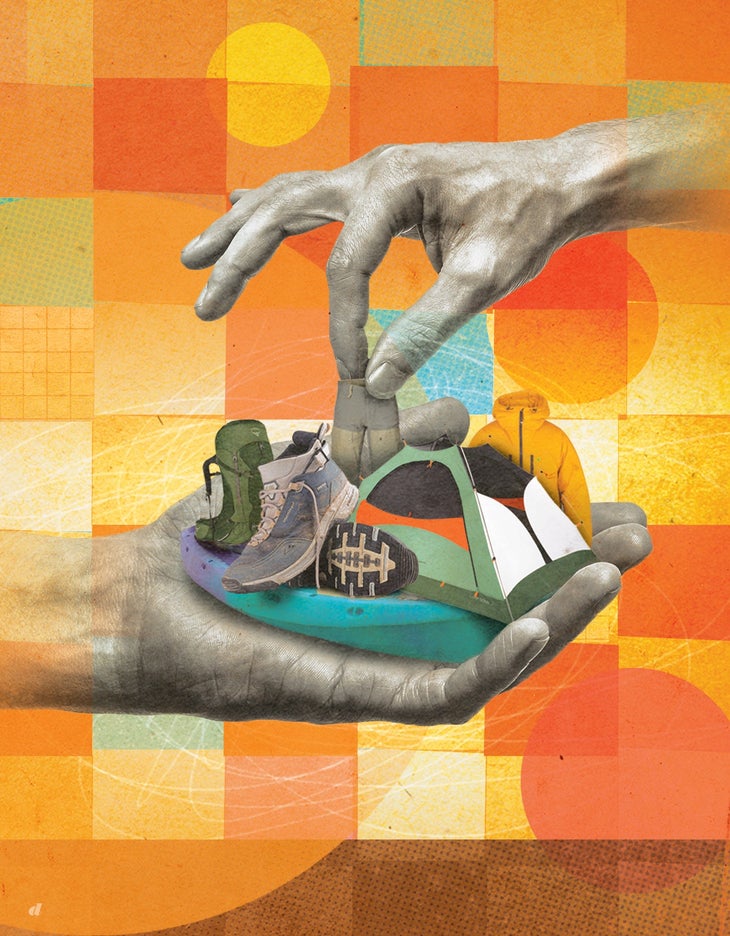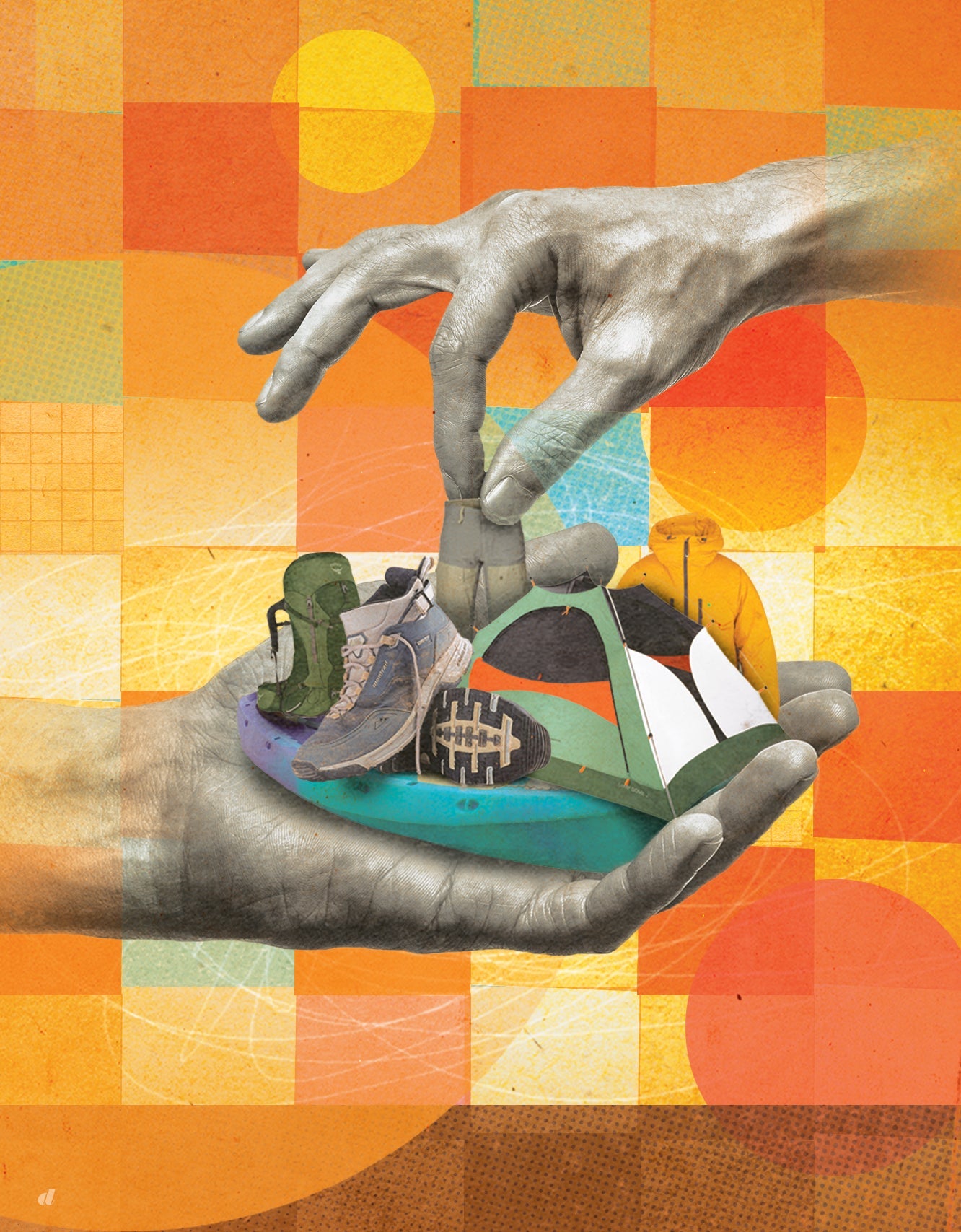If it’s not a big-box store and it’s not an independent specialty retailer, then what exactly is it?
REI Co-op defies easy definition. It’s a builder of brands and a risk to them. It competes with smaller shops around the country while throwing its weight around to protect recreation access and grow outdoor participation. It’s a powerhouse that holds influence over its partners, customers, and politicians. And it’s a profitable business that isn’t totally profit-driven: annually, it gives back millions of dollars to co-op members in the form of dividends, and reinvests millions more into industry causes. Still, in some ways, it’s also a bully.
Undeniably, REI—with its 154-plus stores in 35 states and Washington, D.C., and six million members—is the big fish in the outdoor industry’s pond. And for every small retailer who bristles at yet another brand giving REI an out-of-the-gate exclusive on new gear, or company that feels compelled to target new products to an REI niche, there’s a brand hitting it big-time with the co-op’s help, or a nonprofit enjoying its largesse.
One thing’s for sure: the industry would be a very different place without it.
The Competitor
Independent retailers have always feared REI moving in next door, and that concern has deepened as the co-op targets smaller markets around the country. Case study: REI’s first New Hampshire location will open in North Conway, population 2,300, next fall.
Michael Scontsas, the manager of one of the last Eastern Mountain Sports stores, said he’s not sure what REI hopes to get out of North Conway, nor what to expect when EMS moves out of its current 20,000-square-foot building for a smaller footprint—and REI moves into the space. (EMS announced its plans to downsize first.)
“It’ll be interesting to see what happens because, you know, the pie is only so big here,” Scontsas said. “The other three gear stores are definitely going to feel an impact with REI coming to town.”
But according to a statement REI provided to The Voice, it isn’t out to steal customers: the co-op opens stores where member bases already exist. “When we add a new store, we help impact the outdoors positively, which tends to float all boats,” it noted, adding that REI invests in local communities where it has stores.
Rick Wilcox, president of North Conway-based International Mountain Equipment, doesn’t expect problems: “I think there’s room for everybody if [we’re] careful about what [we] do.” IME’s bread and butter includes specialty ice climbing gear that more generalist stores like REI don’t sell. That’s where problems start, he said—when a generalist store tries to sell specialized gear its customers don’t want, and then floods the market with discounted goods.
Changing times play a role in retailer attitudes, too. “A decade ago, REI was the number-one threat to mom-and-pop specialty retailers,” said Ross Saldarini, co-founder of Mountain Khakis (he left in late 2018). “Today, Amazon has replaced REI as the ecosystem threat.”
The Gatekeeper
To keep its offerings fresh, REI tries to get in on the ground floor with new brands whenever possible—a game-changing boost for a fledgling company. Kuju Coffee landed in all REI shops in September 2018, when the brand was three years old. Co-founder Jeff Wiguna says selling at REI gives instant legitimization to a new brand like his: “They are essentially the industry authenticator,” both to stores and consumers.
But that credibility has its price. To maintain its outdoor-focused product mix, REI requires brand partners to keep distribution tight—without much presence in big boxes or mass e-tailers.
“We draw the line at some stage—if [vendors] are ubiquitous, then that’s not specialty anymore,” said REI general merchandishing manager Marshall Merriam. “That’s when we start to pull away and say, ‘That’s not the best thing for our members.’ So yes, we push them.” That’s on Wiguna’s mind as he works to grow Kuju Coffee beyond the outdoor crowd.
REI was a huge boon to BioLite, too, which launched in 2012 and was scouted by REI while it was still selling direct-to-consumer only. When BioLite started distributing its CampStove in REI stores, it was too short-staffed to both manage the REI account and work to expand in independent shops. The company has grown exponentially since REI lifted them from obscurity, but co-founder and CEO Jonathan Cedar said the brand has found it challenging to break into specialty shops because they didn’t build the necessary relationships from the get-go.
“If I were to go back and do it again, I would probably put larger effort [on specialty retail] right out of the gate,” Cedar said.
What REI wants, or might want, impacts the rest of the industry, too. Brands angling for a spot within REI often develop products with that goal in mind, said Grassroots Outdoor Alliance president Rich Hill, who has previously held executive titles at brands like prAna, Patagonia, Marmot, and Ibex. And they don’t just think, “Will REI buy this?” but, “Will this specific buyer at REI want it?”
“It gets down to that level,” Hill said. “With clothing, is it technical or is it lifestyle? Which one of those departments will buy more? REI is a huge organization with tons of layers, and you have to be really specific when you go in there. People absolutely target their product development on the needs of REI.”
United by Blue CEO Brian Linton acknowledges his brand considers REI’s needs in the design stage. “They’re a significant player in the industry and an important part of our business,” he said. “But we’re also very careful we don’t let that overly dictate our product strategy.”
And Bill Gamber, co-founder of Big Agnes, said his brand’s partnership with REI is a bit of a balancing act. “REI has been a great partner, and supported us early on,” he said. “On the other side, REI can tend to try to control the direction of your brand, product assortment, and more. We just need to fight for who we are sometimes.”

The Changemaker
Because it’s so big ($2.62 billion in sales in 2017), REI has the budget to pack a lot of positive punch, like donating $1 million to create the Nature for Health program at the University of Washington in 2018; celebrating outdoor women of all sizes, skin colors, and ages with its Force of Nature campaign in 2017; and inventing the #Opt�����ԹϺ��� movement in 2015.
The retailer is also in a position to make a huge environmental impact. Even as the industry publicly grapples with sustainability issues, brands aren’t facing many external pressures to do business more responsibly, either from legal standards or consumer demand.
But REI is stepping into this vacuum: in April 2018, the co-op announced product sustainability requirements for all vendor partners, including having a supply chain code of conduct regarding social and environmental standards. The co-op will also put the kibosh on long-chain per- and polyfluoroalkyl chemicals (commonly used in DWR treatments) starting in 2020, as well as on certain toxic flame-retardant chemicals used in tents, and sunscreen products made with oxybenzone, a chemical found to be harmful to coral reefs. REI requires all apparel and footwear brand partners to regularly complete a Higg Index Brand Module to evaluate their sustainability, and share the results with REI.
“We want to make sure that we’re aligned with the science, and that we’re reflecting the way that the industry should be headed,” said Greg Gausewitz, product sustainability manager for REI.
And many brands applaud the effort, even if it poses a challenge. Linton says the new standards are pushing United by Blue to address some issues, like Fair Trade and bluesign certification, sooner than it otherwise would have. “The standards they’ve set forth are by far the highest expectations we’ve seen from any retailer,” he noted. “I think it’s important for key retailers to do these things, so the industry makes progress faster.”
The Gateway
No one seems to dispute that one thing REI does better than most is broadening the outdoor base, converting more people into outdoor lovers by giving them an affordable entry into activities with high upfront costs. Not only do members enjoy dividends, special sales, annual 20-percent-off coupons, and access to garage sales, but REI’s in-house brand also offers products at a lower price point than many of its vendors.
That emphasis on affordability means that brands selling at the co-op should be wary of pricing, Hill said: REI can “love a brand to death.” Once a brand gets to the point where its products are sold in all REI stores, the co-op may ask them to discount gear for its promotional periods. “As brands participate more and more in the requested off-price activity, it can ruin the brand—not within the industry, but within REI,” Hill said, because customers quickly learn to expect discounts.
The Friendly Giant
“We should be thankful about [REI’s] willingness to participate in the outdoor industry the way they do,” Hill said. “They want us all to succeed. They do a lot of things that they don’t necessarily have to do, but they know it’s for the greater good. I give them credit for that.”
And unlike companies that must hold market value above mindful business practices, REI’s co-op model offers it flexibility for taking stands on issues and making investments that shape the outdoor industry and recreation for all.
So imagine that there hadn’t been an REI these last 81 years. The industry might be without a household name that has, in turn, helped build other brands into household names. We might lack a major power player that has helped to influence public policy. And what other retailer would have both the influence and the freedom from shareholders to force advances in sustainability?
Maybe someone else would have evolved to take on these roles. Then again, maybe not.


